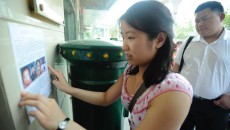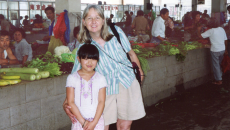I have three daughters adopted from Brazil, India, and China. I have always assumed that some day we would travel back to their birth countries to knit together with their home in America the sights, sounds, stories and memories of the places where their lives began. I believed that they would never put together the pieces of their complex identity and history without such an odyssey. Over the years, I have said that I was ready to go when they were ready.
My eldest daughter, after saying she wouldn’t go if she needed shots, decided as a young teen that she would go if I could persuade some of her friends adopted from the same town in Northeast Brazil to go with us. When I sadly failed to enlist them and their families, she lost interest.
On another occasion I was asked to teach in my Indian daughter’s hometown of Pune. We made all the arrangements but in the end she decided she would rather stay home. I was disappointed, but respected her sense of hesitation.
So it was my youngest, my 9-year-old, Lily, who first took me up on the offer to travel to her birth country, China. She had no hesitation, and greeted the possible adventure with eagerness and curiosity. As I began to research travel to China, I discovered a tour offered through Our Chinese Daughters Foundation, designed for Chinese adopted daughters of American families. We signed on eagerly.
Off to China
I was glad Lily would be with other adoptive families so she would not feel too odd walking around in China with her freckle-faced, long-nosed mom. I was also relieved that our travel group would be matter-of-fact about adoption, not seeing our family as exotic. Since we’d be traveling with other children, the pace and sites would be kid-friendly.
Sharing Histories
While all of this was indeed to the good, it was not the important part. I didn’t realize the true benefit of traveling with this group until several days into the trip. That afternoon, the young girls took over the back of the bus. With our large parental ears we began to catch snippets of animated conversation. “So how old were you when you were abandoned?” “Where were you left?” “Do you know who found you?” “Did your birth mother leave a note with you?” “Do you know your real birth date?” “What province are you from?” “Did you have a foster mother?” “Do you know about the one-child policy?” “Do you think the fines for having a second child are that big?” “Do kids tease you at school?” “Do they do that funny Chinese/Japanese eye-thing?” “I hate it when they do that, don’t you?” “What do you do when they do that to you?” “We are all from China, but we each look so different!” It was not the answers that seemed to matter most; it was engaging the questions with each other.
In other words, these young girls, ages four to nine, were quickly forming friendships in which they could safely share their adoption and family experiences. They were no longer different from their friends, but just like them, and there was sweet satisfaction to be heard in their voices.
A Great Adventure
These spontaneous conversations were interspersed with swimming, hutong tours, bowling, endless popsicles, the Great Wall, visits to Chinese elementary schools, a cruise down the Li River, acrobats, Taoist monasteries, street markets, and lots of white rice with soy sauce. Visiting West Lake in Hangzhou early in the morning they saw the beauty of thousands of people peacefully exercising together before work: Tai Chi, aikido, sword dancing, and ballroom dancing! Our daughters’ eyes feasted on the multiple statues of deities in the temples. They enjoyed the gentle guidance of Chinese adults who helped them with their chopsticks, bowling strategies, Yuan change. Each girl dived into the tour with great energy and curiosity, devouring both similarities to and differences from her present home.
Understanding Their Past
On parting it was clear that the girls all enjoyed China, wanted to return to visit again, were glad they lived in America, and were eager to maintain connection with each other once back home. It was also clear that some of the children had felt viscerally the difficulties their birth families may have faced in China. With their child eyes they could see people traveling long distances on their bicycles in the oppressive heat. They saw small four-room dwellings where three generations lived. They watched quietly out the bus windows as the city gave way to poor conditions in the countryside. Several visited their orphanages and saw the bleak baby rooms, the many toddlers and children waiting for families. They saw the almost ecstatic look in several older women’s eyes who communicated with “thumbs up” hand gestures how glad they were to see these Chinese daughters happy in their families.
I am clearer now why my Brazilian-born teenage daughter will only go back to Brazil if her Brazilian American friends travel with her. It is they who took the same journey as she, are searching for the answers to similar questions as she, with whom even without answers there is that sense of intimacy that comes with living the same unknowns. When I got back home, I wrote to her friends’ families again…maybe next summer. My middle daughter born in India just smiles, shakes her head at me, and says she prefers home.



